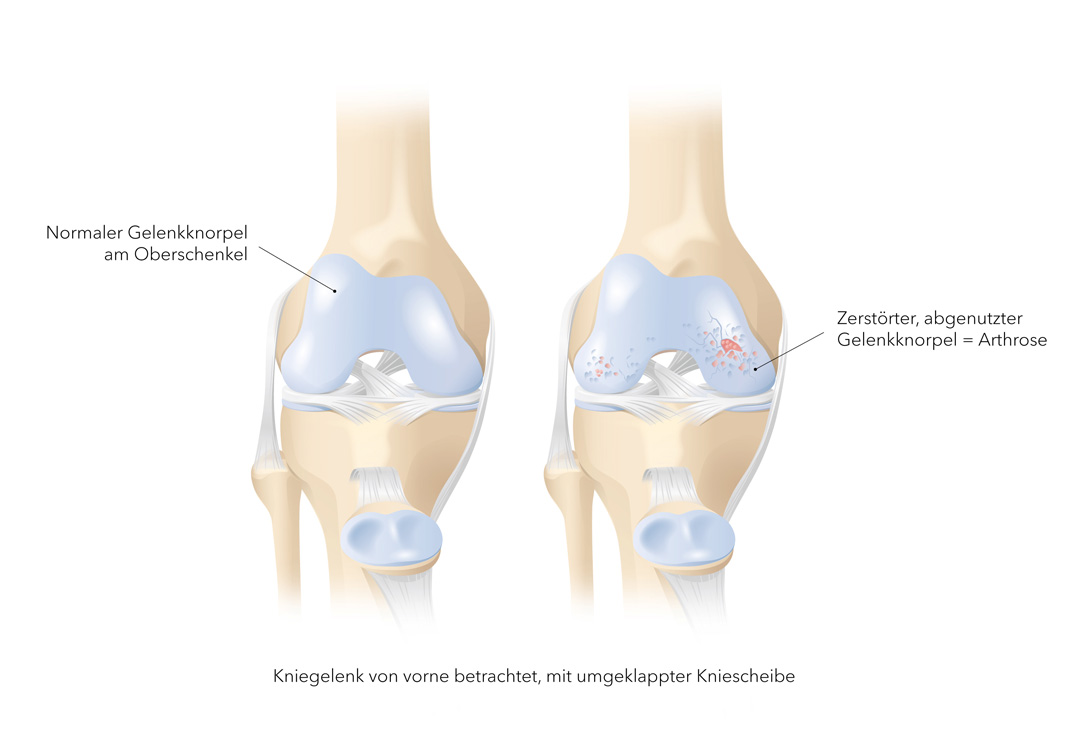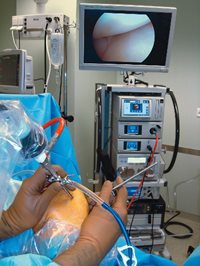Osteoarthritis of the knee (Gonarthrose)
Cause | Symptoms & pain | Diagnosis | Conservative treatment methods | Surgical treatment methods
Osteoarthritis of the knee (gonarthrosis) develops when there is a long-term imbalance between the capacity of the cartilage to withstand stress and the actual stress. Likewise, an accident can also lead to cartilage damage. Especially in the knee joint, the form and axes of the bones must fit together well. Disturbances in this system or in the muscle/ligament apparatus favour the development of osteoarthritis. In principle, each restriction of the joint cartilage, synoviuim or synovial fluid can lead to osteoarthritis. Long-term, extreme obesity can also have an effect: the more overweight, the greater the stress on the knee joint.
Especially in the knee joint, the form and axes of the bones must fit together well. Disturbances in this system or in the muscle/ligament apparatus favour the development of osteoarthritis. In principle, each restriction of the joint cartilage, synoviuim or synovial fluid can lead to osteoarthritis. Long-term, extreme obesity can also have an effect: the more overweight, the greater the stress on the knee joint.
Learn more here about osteoarthritis and the stages.
The following pains and problems can occur in advanced osteoarthritis of the knee and can be different in each person:
- Stress pain
- Movement pain
- Start-up pain
- Inflammatory pain with joint effusion
- Deformation of the joint (bow legged or knock-kneed)
- Instability (gait instability with a risk of falling)
- Restriction of movement
- Muscle tension, muscle shortening and muscle weakness
Strong knee joint pain with accompanying impairment when starting movement must be investigated carefully. After questioning the patient personally regarding when and how the pain occurs, there follows a comprehensive clinical examination of the knee joint to assess and localise the pain, movement restrictions, differences in leg length and muscle strength. This is followed by a radiological investigation of the knee joint as well as a whole-leg X-ray when standing to determine the stress axes and positioning of the knee joint. In the event of uncertainty, MRI (magnetic resonance imaging) can also be performed to assess the cartilage situation in the knee joint better. Once all investigations are completed, the results are discussed with the patient and the next steps are decided.
What therapies exist for osteoarthritis of the knee?
If the osteoarthritis of the knee is not yet too advanced, it can be treated conservatively with special shoe inserts and medications against the pain and/or to strengthen the cartilage as well as with weight reduction. A brief overview of the treatment options available:
- Anti-inflammatory and pain-relieving medications
- Medications and substances to strengthen the cartilage
- Medical exercise therapy/physiotherapy
- Injections into the joint of lubricants (hyaluronic acid), anti-inflammatory medications (cortisone) or autologous blood therapy
- Aids such as walking sticks, inserts, orthopaedic shoes
- Lifestyle changes in regard to sport, obesity, diet, etc.
These measures can reduce the pain of osteoarthritis and slow the progression of the cartilage degradation. Unfortunately, the osteoarthritis itself cannot be stopped or corrected.
Injections with hyaluronic acid
The hyaluronic acid product is a synthetic lubricant manufactured for joints. These injections into the joint reduce the abrasion of the arthrotically changed cartilage surfaces. The joint can then move better. In addition, the joint is less irritated owing to the lubricant, reducing the joint inflammation caused by the osteoarthritis. This reduces the osteoarthritis pain in turn.
The effectiveness of the lubricant injections is dependent on the stage of the osteoarthritis. Many patients recover a good quality of life thanks to these lubricant injections. Initially, three injections of lubricant are given overall, at intervals of one week. This is performed in our surgery. The effect of the lubricant injections persists for a certain time. If the response is good, the injections can be repeated at any time.
As not all patients respond equally well to these lubricant injections, the costs are not paid by health insurance. The price for a lubricant injection to treat osteoarthritis of the knee is around CHF 130.
Learn more about injections with hyaluronic acid here.
Autologous blood therapy
With the autogologous blood therapy the body's own wound healing ability is strengthened. Learn more about the injections here.
Surgical treatment methods
There are various therapies to choose from, depending on how advanced the osteoarthritis of the knee is and how much of a burden the problems are. It is important that you consult a specialist who can assess all therapy options and perform a comprehensive examination.
If the conservative treatments are not successful and the quality of life is severely restricted owing to an unstable gait and knee pain, surgical measures must be taken into consideration.
We present the possible procedures in detail on the following pages. These include all possible risks and the continuing treatments such as physiotherapy.
Joint-preserving surgeries
- Joint imaging (arthroscopy)
- Repositioning (e.g. from bow legged to knock-kneed)

Artificial replacement of the knee joint
Order your free brochure or book an appointment.
Our doctors have extensive experience and expertise in joint and sport surgery. PD Dr Andreas L. Oberholzer is a certified knee expert with broad experience in the field of osteoarthritis of the knee. He trains overseas doctors in this field and promotes the development of soft-tissue-oriented techniques for implantation of artificial knee joints. Learn more about his activities here.
We guarantee a fast, specialist investigation and consultation as well as treatment with the latest options. You can also ask us to provide a second opinion.